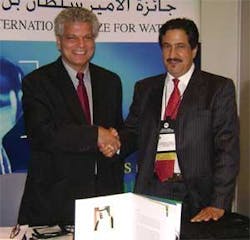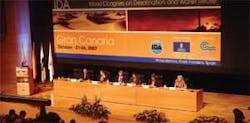Quenching a Thirst for Desalinated Water Technology
The IDA World Congress on Desalination & Water Reuse broke attendance records in Spain’s Canary Islands in 2007.
By Eng. Mohamad Amin Saad
The setting couldn’t have been more exotic or the venue any less fitting. Maspalomas, on the Spanish island of Gran Canaria, a beautiful holiday sensation in the Canary Islands, hosted the International Desalination Association (IDA) biannual World Congress on Desalination & Water Reuse from Oct. 21–26. With its unique mix of sun, seawater, beach and sand dunes, the island – the largest and most populated of the Canary Islands – truly symbolized what the event is all about, underscored by its appropriately chosen theme, “Quenching a Thirst”.
As the largest and most recognized event of its kind in the world, the Congress has become a powerful platform for local, regional and international water companies, highlighting a flurry of exciting technical sessions, panel discussions and hallway meetings. With the support of local organizations such as the Cabildo de Gran Canaria and Consejo Insular de Aguas de Gran Canaria, as well as corporate sponsors such as Acciona Agua, Elmasa and GE Water, a record–breaking 1,300 delegates, representing some of the most influential regional and international end–users, plant owners, manufacturers, suppliers and consultants, attended the 2007 event. This heavy presence reflects a marked increase over attendance of the last congress, held in 2005 in Singapore, which itself broke records at nearly 1,000 delegates.
Tucked in the middle of the Atlantic Ocean, adjacent to the Sahara Desert and midway between Europe and Africa, the Grand Canaries was the site where Spain commissioned its first large desalination plant on the island of Lanzarote in 1970. This is also where most of the country’s advances in the desalination industry have taken place. What makes the island particularly interesting as the site for this event is that Gran Canaria relies heavily on desalination. With 1,555 sq. km. and 850,000 inhabitants, desalination has given the island a high degree of development. It’s also a testing ground where all new desalination technologies, such as integrated wind and solar power, have been introduced and improved over the last 35 years. In such a small, hilly territory, with over 60 high dams and 1,700 deep wells, desalination has become the most important potable water resource in the island, accounting for 40% of total supplies for domestic, industrial and agricultural uses, and 80% of the island’s total domestic needs – supplying potable water for the entire population as well as three million tourists each year. It was also the site where the first reverse osmosis (RO) brackish water desalination plant for agricultural use, the first RO desalination plant fitted with energy recovery devices, and the largest desalination plant in the world fitted with spiral wound membranes were built in 1990. Today, Gran Canaria has the capacity to desalinate 150,000 m3/day of seawater, leading the rest of the country in this sector.
A brief reception on Sunday night began the week’s activities with a Spanish–flavored acrobatic and light show, as the delegates started gathering at the Palacio de Congresos, the island’s Convention Center. The official opening ceremony in the auditorium Monday morning drew a number of top officials as delegates or keynote speakers. They represented the Spanish government and local water authorities, as well as international public and private business leaders and water experts – most notably, the Spanish Minister of the Environment, as well as top water officials from such desalination bastions as Singapore, Saudi Arabia and the United Arab Emirates, in addition to the International Water Association (IWA). Coincidentally, the UAE is where the next one will be hosted in 2009. In his keynote speech on behalf of Singapore’s Minister of the Environment, Mr. Chan Yoon Kum, PUB’s assistant chief executive, noted that “both Singapore and Gran Canaria share the problem of limited water resources with the irony of plentiful seawater surrounding the islands”.
Widely noted was the presence and active participation of one of the Congress’ major sponsors: the Prince Sultan International Prize for Water, represented by general secretary Dr. Abdulmalek A. Al Alshaikh, who received his graduate engineering education from the University of Arizona in Tucson, Arizona, USA. This international scientific prize is a significant contribution from the Kingdom of Saudi Arabia to resolution of global water issues, which represent one of the most pressing human, economic and political concerns worldwide.
In an exclusive interview, Dr. Alshaikh noted, “For the first time, ‘Innovative Methods and Systems in Desalination’ was added as the topic for the Prize’s third branch of award, ‘Alternative (non–traditional) Water Resources’”. Indicating that a new Creativity Prize also will be given among the 2006–2008 awards to every innovator or pioneer who effectively and distinctively contributes in creating a new work that’s considered a breakthrough, accurate and original, he added, “The Prize’s main objective is to solve the problem of water shortage inexpensively, with desalination as a major water resource”. Dr. Alshaikh strongly encouraged the desalination community at the Congress to submit their nominations for that category as well as for the other four branches. All nominations, he reiterated, “will be carefully and fairly considered by several levels of reviewing scientific panels, both Saudi and international, to ensure that the prizes are awarded to the most deserving people”. He expressed his passion about the issue of water harvesting as a viable source of usable water, highlighting the Kingdom’s efforts in that direction.
Coinciding with conference sessions, a sold–out exhibition, featured several major local and global firms, public utilities, agencies and other suppliers, showcasing their latest technologies, products and services in the water market. A specially featured Spanish Pavilion hosted big names – Acciona Agua, Aqualia, Befesa, Cadagua, Elmasa, Inima, Predisa, SADYT, Tedegua and others.
At the Congress proceedings’ conclusion, four one–day technical training workshops were held. The MASAR Workshop – the most attended of the four – focused on “Membrane Desalination Technologies in Practice” and was conducted by the author, the CEO of MASAR Technologies Inc., and with over 24 years of technical expertise and plant experience, especially in the Middle East and USA. The other three workshops subjects ranged from desalination management and economics, membrane bioreactor (MBR) technology, and basic RO principles and troubleshooting techniques.
After election of the new two–term IDA Board of Directors, history was set again with selection of CH2M Hill vice president and global desalination director Lisa Henthorne as its first woman president. She took the reigns from her Spanish predecessor, Jose Antonio Medina, chief desalination engineer in Cedex, the technical department of Spain’s Ministry of Public Works & Environment. Conveniently operating from Dubai, UAE, the site of the next Congress, Henthorne pledged to lead the association’s thrust into a strategic re–evaluation of its mission and role in an era of heightened water demand, acute water supply shortages, breathtaking technology advancement, and lack of public education and awareness of the desalination industry.
Culminating the weeklong series of IDA World Congress events, attendees got a special Canary Night treat from the Asociación Tecnologica para Tratamiento del Agua (ATTA). It included a banquet dinner and ended with a dazzling show of light, sound and dance, highlighting the island’s folklore heritage in a Las–Vegas–style stage performance, complete with an award presentation, symphony performance with unique backdrop of sunset and fireworks show.
Author’s Note:
Mohamad Amin Saad is president of MASAR Technologies Inc., based in Tucson, Arizona, USA, and chief consultant/trainer for its Water Desalination & Membrane Technologies Division. Contact: 520–797–4311, www.masar.com or www.masar.com.sa



